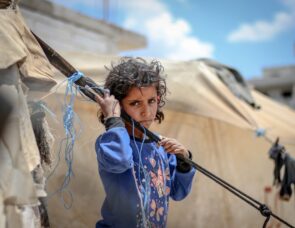These group study questions have been put together to go alongside Rosie Button’s sampler Bible reading notes ‘God’s heart for refugees’ from Guidelines. You can get hold of the sampler for free, either digitally or in print, from BRF Online.
The sampler has been taken from BRF’s Bible reading notes Guidelines May–August 2023. Guidelines is a unique Bible reading resource that offers four months of in-depth study, drawing on the insights of current scholarship. Its intention is to enable all its readers to interpret and apply the biblical text with confidence in today’s world, while helping to equip church leaders as they meet the challenges of mission and disciple-building.

1 Love the foreigner as your own
Deuteronomy 24:10–22; 26:1–11
After reading the passages and notes, discuss the following questions:
1. Deuteronomy 24:19–21 gives the mandate to allow for ‘gleaning’. What is the basic principle and what would be some modern-day ways we could do this?
2. Deuteronomy 26:11 again gives a command to the Israelites, to include the foreigner in their celebration of the Firstfruits. Discuss ways we could include refugees in our celebrations, as churches and in our homes, and talk about the impact this could have for them, and also for us and for the gospel.
2 He led them to a city where they could settle
Psalm 107:1–17, 23–32, 43
1. After reading the selected verses of this long psalm, and before reading the notes, try to answer this question: Who are the various groups of ‘wandering people’ in this psalm? Notice God’s response to each of them.
2. After reading the notes, look again at how the psalm ends: ‘Let the one who is wise heed these things, and ponder the loving deeds of the Lord.’ In the ESV it says, ‘Consider the steadfast love of the Lord.’ The notes ended with the challenge, ‘Do we have this same heart for those who come among us? Are we being his hands and feet to them?’ Discuss this and pray as a group for us all to know how to have God’s heart for refugees.
3 The God who sees
Genesis 16:1–14; 21:9–19
1. After reading the two passages, and before reading the notes, answer this question: Why is God’s attention and care for Hagar possibly quite surprising, given the bigger picture of the narrative?
2. After reading the notes, discuss: How do we see God’s response to Hagar reflected in the way Jesus responded to people in the gospels? You might think of lots of examples.
3. The idea of God being the one who sees those who are alone, rejected, frightened, desperate and lost not only means he sees and loves refugees, it also means he sees and loves each of us. You might want to ponder the implications of this for yourselves.
4 Refuge under God’s wings
Ruth 1:1–22; 2:11–12
After reading the passage and notes, discuss the following questions:
1. In what particular ways are the circumstances of refugees who have come to live in our hometowns similar to Ruth’s situation?
2. Discuss the comment in the notes, ‘Refugees are not outside of God’s plans.’ What do you think about this? Of course, the way God used Ruth was extraordinary in that she became the ancestor of Jesus Christ, the Messiah and Saviour of the world! But doesn’t the inclusion of Ruth in Jesus’ ancestry teach us something?
5 God’s plan for the nations
Acts 17:16–34
After reading the passage and notes, discuss the following questions:
1. Paul refers to the Athenians’ altar to the unknown god, and he even used quotes from Greek poets (v. 28) to teach the Athenians about God. What does this teach us about other religions?
2. How could we learn from Paul’s approach if meeting non-Christian refugees in our neighbourhood, and what are the implications for us?
6 Welcome the stranger
Romans 12:1–16
After reading the passage and notes, discuss the following questions:
1. What does the term ‘hospitality’ mean to you and how do you practise it? Do you agree that understanding the meaning of the biblical word for hospitality (‘love of stranger’) is quite challenging for British Christians?
2. Can you think of a time when being included and invited in impacted you?
3. Discuss ideas for how, as a church and as individuals, we could be more hospitable, especially to refugees living near us.
Guidelines
1. The closing ‘Guidelines’ notes ask you to consider the question: Why does the statement, ‘Jesus himself was a refugee’ mean we should help refugees? Discuss this as a group.
2. Spend some time listing all the different individuals and peoples who were refugees or displaced people over the course of the Bible and think about how God showed love and care for each of them.
3. You could spend some time praying as a group for the various groups of refugees mentioned in the closing notes.

 Download
Download